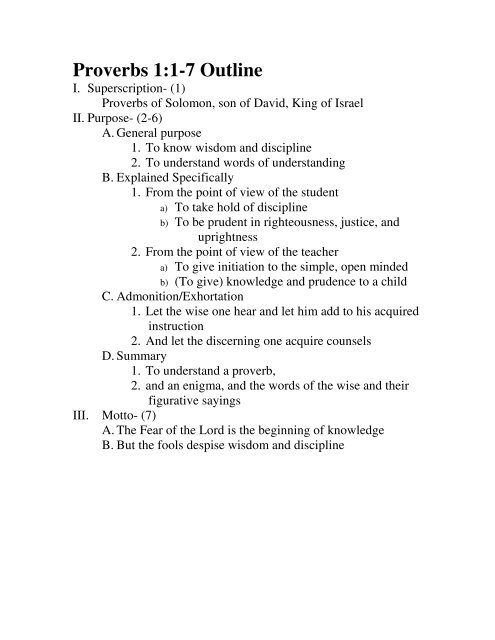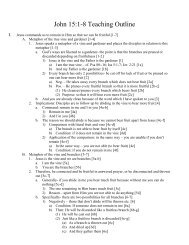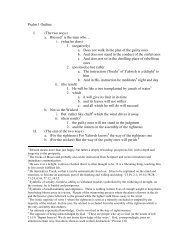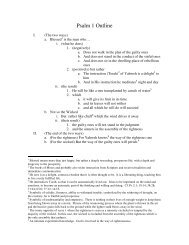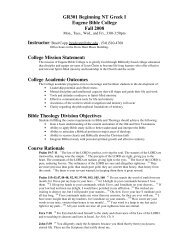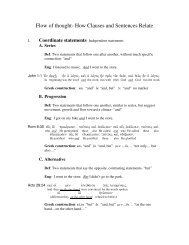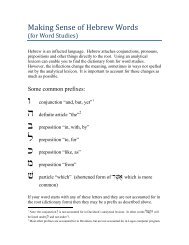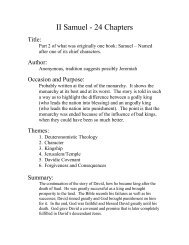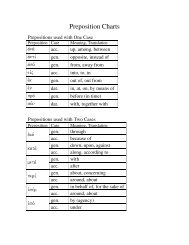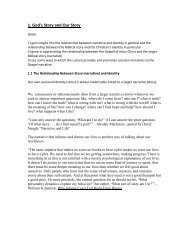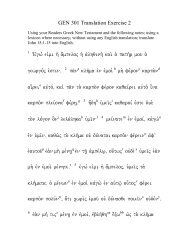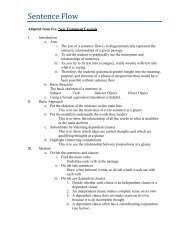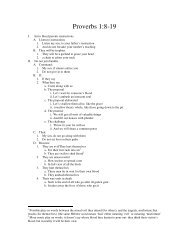Proverbs 1:1-7 Outline - Bradcopp.com
Proverbs 1:1-7 Outline - Bradcopp.com
Proverbs 1:1-7 Outline - Bradcopp.com
You also want an ePaper? Increase the reach of your titles
YUMPU automatically turns print PDFs into web optimized ePapers that Google loves.
<strong>Proverbs</strong> 1:1-7 <strong>Outline</strong><br />
I. Superscription- (1)<br />
<strong>Proverbs</strong> of Solomon, son of David, King of Israel<br />
II. Purpose- (2-6)<br />
A. General purpose<br />
1. To know wisdom and discipline<br />
2. To understand words of understanding<br />
B. Explained Specifically<br />
1. From the point of view of the student<br />
a) To take hold of discipline<br />
b) To be prudent in righteousness, justice, and<br />
uprightness<br />
2. From the point of view of the teacher<br />
a) To give initiation to the simple, open minded<br />
b) (To give) knowledge and prudence to a child<br />
C. Admonition/Exhortation<br />
1. Let the wise one hear and let him add to his acquired<br />
instruction<br />
2. And let the discerning one acquire counsels<br />
D. Summary<br />
1. To understand a proverb,<br />
2. and an enigma, and the words of the wise and their<br />
figurative sayings<br />
III. Motto- (7)<br />
A. The Fear of the Lord is the beginning of knowledge<br />
B. But the fools despise wisdom and discipline
<strong>Proverbs</strong> 1:1-7 Detailed <strong>Outline</strong><br />
I. Superscription- (1)<br />
A. <strong>Proverbs</strong> of Solomon, son of David, King of Israel<br />
II. Purpose- (2-6)<br />
A. General purpose<br />
1. To know wisdom and discipline<br />
a) To know- t[;d:l' experiential knowledge, know from experience, not just<br />
from intellect or heresay<br />
b) Wisdom- hm'k.x' skill, cf. Ex. 28, general term, skill in anything, but<br />
here specifically skill in life- skill in living within the laws of God’s<br />
created order such as: reciprocity; freedom within form; liberty within<br />
law; love within restraint- religious and ethical state of knowing what<br />
conforms with divine reality, with truth and acting upon it, thereby<br />
enabling one to cope with enigma and adversity and to succeed.<br />
c) And discipline- rs"WmW Instruction, not necessarily negative disciplineassumes<br />
an instructor who knows and a disciple who learns. Discipline<br />
in the school of wisdom.<br />
2. To understand words of understanding hn"ybi<br />
To hear and understand, without fear of the Lord, is just external hearingcf.<br />
Isa. 6:9-10. Understanding, insight into how the world is put<br />
together, grasping, making the connection and putting it all together<br />
B. Explained Specificallypackage<br />
deal- if you have wisdom, you have all the things about to be<br />
mentioned. If you don’t have wisdom, you don’t<br />
1. From the point of view of the student<br />
a) To take hold of discipline<br />
(1) Take hold of- tx;q;l' To receive with favor, to accept, to embrace<br />
(2) Discipline- same word as v. 2.<br />
b) To be prudent- lKef.h Four parts of the idea of prudence:<br />
(a) Looking intently with close attention,<br />
(b) Having insight and understanding<br />
(c) Acting rightly, circumspectly, accordingly and<br />
(d) Therefore prospering and having success<br />
(2) in righteousness- qd
a) To give initiation to the simple, open minded<br />
(1) To give- ttel to give<br />
(2) To the simple- ~yIat'p.li One who is open, un<strong>com</strong>mitted, raw youth<br />
without instruction- not low IQ, but uninstructed in morality, unaware<br />
of evil and dangers, not yet developed moral acumen- like a green<br />
(naïve, inexperienced) soldier just arriving in a war zone, not yet<br />
aware of the dangers and minefields (moral traps, sex traps, addiction<br />
traps). There is two stages of the simpleton: the unformed (here) and<br />
the malformed (fool). If the simpleton passes through life without<br />
<strong>com</strong>mitment to wisdom, they turn into the fool.<br />
(3) Prudence, craftiness- hm'r>[' Knowing where one is going and how<br />
to get there, knowing dangers- intentional and familiar with the<br />
territory, experienced<br />
b) (To give) knowledge and prudence to a child<br />
(1) To a child- r[;n:l. young lad, inexperienced<br />
(2) Knowledge- same word (to know) as v.2 in noun form<br />
(3) And discretion- hM'zIm.W Shrewdness, prudence resulting from<br />
deliberation, power of devising, scheming, thinking through- cf. 2:11;<br />
3:21, 5:2, 8:12 word is typically used negatively of evil schemes in<br />
plural; this form is singular and has positive connotation- like the<br />
soldier receiving basic training<br />
C. Admonition/Exhortation<br />
1. Let the wise one hear and let him add to his acquired<br />
instruction<br />
a) Let him hear- [m;v.yI same word also means to obey, the two connotations<br />
are rarely separated<br />
b) Wise one- ~k'x' ‘The wise’ are those who are mature, who have made a<br />
<strong>com</strong>mitment to wisdom. The wise continue learning, they model<br />
learning and never stop, there is no end to the learning of the wise. No<br />
one is beyond wisdom.<br />
c) And let him add- generic term<br />
d) Instruction that is acquired- xq;l, cf. v.3 (related word from the same<br />
root)- doctrine, teaching, that which is accepted, received<br />
2. And let the discerning one acquire counsels<br />
a) The discerning one- one who understands- participle form of the word<br />
used in v. 2- (understanding)<br />
b) Counsels- tAlBux.T; Direction, steering [of ship], guidance, cf. 11:14;<br />
24:6; 20:18 and items matched there in parallelism (advisors, advice).<br />
c) Let him acquire- hn
a) To understand- same word as v.2,5 understand, give heed to<br />
b) A Proverb- lv'm' cf. cf. 1:1, Comparison or analogy for the purpose of<br />
providing a model, exemplar, paradigm- <strong>com</strong>parison re: function-<br />
“truths by which you can <strong>com</strong>pare your life”- Waltke. Open end<br />
illustration so we can make <strong>com</strong>parison to our life and live accordingly<br />
<strong>Proverbs</strong> 16:8 Better a little with righteousness than much gain with injustice.<br />
2. and an enigma, and the words of the wise and their<br />
figurative sayings<br />
a) satire, enigma- hc'ylim.W Allusive expression,<br />
(1) Often mocking, scornful saying, cf. Hab. 2:6 akin to the scoffer<br />
throughout proverbs.<br />
(2) But in Gen. 42:23, Isa. 43:27 and Job 33:23, it takes the connotation<br />
of interpreter, interpretation.<br />
(3) The idea is not the interpretation of the proverb, but the interpretation<br />
and application of the proverb to life.<br />
(4) We need wisdom to make appropriate interpretation and application<br />
to life<br />
<strong>Proverbs</strong> 26:7 Like a lame man’s legs that hand limp is a proverb in the mouth of a fool.<br />
<strong>Proverbs</strong> 26:9 Like a thornbush in a drunkard’s hand is a proverb in the mouth of a fool.<br />
Wisdom is needed in reading proverbs- not just understanding the words, but<br />
knowing when and how to apply the proverbs.<br />
On 26:7,9- “<strong>Proverbs</strong> like these indicate that memorizing proverbs doesn’t help a<br />
person navigate life well. There is nothing wrong with knowing the proverbs, to be<br />
sure, but such knowledge is not sufficient. After all, ‘a man finds joy in giving an<br />
apt reply—and how good is a timely word!’”- Longman Provs. p. 18.<br />
b) words of the wise ones, sayings of the wise cf. v.5;22:17, chs. 30-31.<br />
examples of words of the wise, note in ch. 30 he denies he has wisdom,<br />
but wisdom <strong>com</strong>es from God, that is what makes him wise.<br />
c) And their riddles- ~t'doyxiw> Figurative sayings, riddle, something locked<br />
up, perplexing, something spoken indirectly, cf. IQ and ability to see<br />
metaphor, so also wisdom quotient and ability to see and apply that<br />
which is spoken indirectly. Cf. Jdg 14:13,18; Num 12:8.<br />
“Running throughout <strong>Proverbs</strong> and wisdom literature in general is the<br />
idea that proverbs are not universal truths that are always relevant and<br />
rightly applied; rather, they are context-sensitive…Wise people know<br />
not only how to interpret words on the page or the words spoken by<br />
other people but also how to interpret people themselves and, more<br />
broadly, the situation in which they find themselves.”- ibid.<br />
Fee and Stuart stress that proverbs are not universal promises, but rather<br />
concise maxims ‘all other things being equal…’<br />
<strong>Proverbs</strong> 22:6 Train a child in the way he should go, and when he is<br />
old he will not turn from it.<br />
<strong>Proverbs</strong> 26:4-5 Do not answer a fool according to his folly, or you<br />
will be like him yourself. Answer a fool according to his folly, or he<br />
will be wise in his own eyes.
A fool will say ‘aha, a contradiction!’ but a wise person will say,<br />
‘there is more here than meets the eye. When should I answer a<br />
fool and why? When not and why not?’<br />
III. Motto- (7)<br />
A. The Fear of the Lord is the beginning of knowledge<br />
1. Fear of the Lord- hw"hy> ta;r>yI<br />
a) Wisdom is God centered<br />
(1) In Prov. The wicked live to themselves and are not mindful of God,<br />
piety, <strong>com</strong>munity and morality<br />
(2) <strong>Proverbs</strong> can be abused easily or misread/misused if you are not<br />
spiritual and spiritually sensitive<br />
(3) There are similarities between <strong>Proverbs</strong> and ANE wisdom, but they<br />
are night and day different because <strong>Proverbs</strong> is centered in Yahweh.<br />
(4) <strong>Proverbs</strong> <strong>com</strong>es from a <strong>com</strong>munity that assumes salvation history and<br />
Torah<br />
b) The foundation of knowledge requires spiritual underpinnings.<br />
(1) The enlightenment is a failure because it denies the spiritual resources<br />
needed to uphold knowledge<br />
(2) Postmodernism is a failure because it seeks the spiritual resources<br />
from the wrong spirits, lying spirits<br />
c) Fear of the Lord has 3 ideas:<br />
(1) Objective revelation = Law of the Lord, ordinances etc. cf. Prov. 2:1-<br />
5, in Psa. 19 parallel to law and testimony. No fear of the Lord<br />
without objective cognitive content, not just emotion<br />
(2) Spiritual response to revelation, humble acceptance of it. Prov. 15:32,<br />
22:4, Isa. 29:13 honor with lips but not hearts, lit. fear of me is rules<br />
of humans. White flag of surrender before revelation- that we see<br />
and understand with our minds and then we bow with our hearts<br />
(3) Hold these truths in awe, recognize the sphere of the Holy One- in<br />
9:10 it is parallel with knowledge of the Holy One- reverence, awe,<br />
obedience and submission<br />
d) Loving God and fearing God are not opposites- paradox not easy to<br />
understand<br />
(1) Dt. 6:4 ff. esp. v. 13- Love God and Fear God<br />
(2) Dt. 10:12, Fear of the Lord, obedience, Loving and serving God are<br />
all <strong>com</strong>manded.<br />
(3) Josh. 24:14- renewing the cov’t- “Fear the Lord and serve Him with<br />
all faithfulness” (parallel to ‘serve’)<br />
(4) Exo. 3 both drawn toward and repulsed<br />
(a) Cf. Otto, numinous- both attracted to it and withdraw from it<br />
(b) Cf. Peter- “depart from me”<br />
(c) Cf. Isa. 6 “Woe is me”<br />
(5) Exo. 14:31 Fear and put trust in the Lord<br />
(6) Exo. 20:20 Fear of the Lord keeps us from sinning
e) “Wise living does not remove fear entirely. It consists of fearing the right<br />
things.” IB en loc. cf. Matt. 10:28<br />
f) In Prov. Fear of the Lord is parallel to wisdom, understanding, and<br />
knowledge.<br />
g) In Prov. Fear of the Lord is contrasted with not just fools, but also the<br />
wicked.<br />
2. Knowledge- t[;D" same word as above<br />
3. Beginning of- tyviarE<br />
a) Cf. Isa. 46:10; Eccl. 7:3; Mic. 1:13; Prov. 4:7; 17:14; Psa. 111:10; Amos<br />
6:1, Dan. 11:41; Dt. 33:21 I Sam. 2:29; 15:21<br />
b) Not just the first of many steps, with the first step being left behind<br />
c) But the chief part which is needed for all other parts.<br />
d) Like the foundation, without which the building falls down<br />
e) What the alphabet is to reading, what numerals are to mathematics, so<br />
Fear of the Lord is to wisdom and knowledge.<br />
f) You never move beyond the fear of the Lord, can never do without it.<br />
g) Do not try to master and control the word, but rather tremble before it.<br />
Always seeking to understand it, but do so by always submitting to<br />
what it says.<br />
h) There is no knowledge without the Fear of the Lord, cf. U of O<br />
B. But the fools despise wisdom and discipline<br />
Antithesis- wise/fool, accept/despise- no middle option, if you are<br />
indifferent to wisdom, you really despise wisdom and therefore are a fool<br />
1. Wisdom and discipline- rs'WmW hm'k.x' cf. v.2 inclusio vv.2-7<br />
2. Foolish ones- ~yliywIa/<br />
a) Fool, incorrigible, intractable<br />
b) Fool that will not budge, a hardened fool<br />
c) <strong>Proverbs</strong> never appeals to a fool to change<br />
d) Rather they are proverbial in their foolishness as <strong>Proverbs</strong> appeals to the<br />
uninitiated<br />
e) There are different classes of fools in <strong>Proverbs</strong><br />
3. They despise- WzB<br />
a) Despise, hold in contempt to the point of rejection, to regard as<br />
unimportant or insignificant<br />
b) Opposite of fear, reverence ary (14:2), honor dbk (I Sam 2:30) and keep<br />
[<strong>com</strong>mandments] rmv (Prov. 19:16)<br />
c) Despising wisdom is the characteristic, almost definition, of fools, 18:3;<br />
23:9<br />
d) Those who treat the Lord with contempt will themselves be despised<br />
(Mal. 1:6-7, 12; 2:9)
<strong>Proverbs</strong> 1:1-7<br />
laer"f.yI %l,m, dwID" -!b, hmol{v. ylev.mi 1<br />
Prop.N. msc Prop.N. msc Prop.N. msc<br />
Israel King of David son of Solomon proverbs of<br />
rs"WmW hm'k.x' t[;d:l' 2<br />
msa+w fsa QInfcs<br />
discipline 1 wisdom 2 to know<br />
hn"ybi yrEm.ai !ybih'l.<br />
fsa msc HiphInfcs<br />
understanding words of to give heed to and understand 3<br />
rs:Wm tx;q;l' 3 4<br />
msa<br />
QInfcs<br />
discipline in the school of wisdom to receive, take hold of 5<br />
~yrIv'ymeW jP'v.miW qd
hm'r>[' ~yIat'p.li ttel' 4<br />
fsa mpa+l QInfcs<br />
prudence, craftiness 11 to the simple, naïve, open minded 12 to give<br />
hM'zIm.W t[;D: r[;n:l.<br />
fsa+w fsa msa+l<br />
and discretion, prudence 13 knowledge to a child, lad 14<br />
xq;l, @s,Ayw> ~k'x' [m;v.yI 5<br />
msa HiphIpf(juss)3ms+w msa QIpf(juss)3ms<br />
instruction that is acquired 15 and let him add wise (one) 16 let him hear 17<br />
hn
t[;D" tyviarE hw"hy> ta;r>yI 7<br />
fsa msc D.N. fsc<br />
knowledge beginning, chief, head, primary part, first phase or step of 24 Yahweh fear, piety, respect of 25<br />
WzB' ~yliywIa/ rs'WmW hm'k.x'<br />
QPf3cp mpa msa+w fsa<br />
they despise 26 foolish (morally bad) ones 27 and discipline wisdom<br />
21 Riddle something locked up, perplexing, something spoken indirectly cf. IQ and ability to see metaphor,<br />
so also wisdom quotient and ability to see and apply that which is spoken indirectly. Cf. Jdg. 14:13, 18,<br />
Num 12:8.<br />
22 Words of the wise, cf. 22:17, ch. 30-31 examples of words of the wise, note in ch. 30 he denies he has<br />
wisdom, but wisdom <strong>com</strong>es from God, that is what makes him wise.<br />
23 Allusive expression, often mocking, scornful saying, cf. Hab 2:6. akin to the scoffer throughout proverbs.<br />
But in Gen 42:23, Isa 43:27 and Job 33:23, it takes the connotation of interpreter, interpretation. The idea<br />
is not the interpretation of the proverb, but the interpretation/application of the proverb to life. Need<br />
wisdom to make appropriate interpretation and application to life. NIV <strong>Proverbs</strong> 26:7 Like a lame man's<br />
legs that hang limp is a proverb in the mouth of a fool. NIV <strong>Proverbs</strong> 26:9 Like a thornbush in a drunkard's<br />
hand is a proverb in the mouth of a fool. –cf. 26:4<br />
24 Cf. Isa 46:10, Eccl 7:3, Mic 1:13, Pro 4:7, 17:14, Psa 111:10, Amos 6:1, Dan 11:41, Dt 33:21, I Sam<br />
2:29, 15:21- not just first of many steps, the first being left behind, but the chief part which is needed for all<br />
other parts, like a foundation without which the whole building falls down. What alphabet is to reading,<br />
what numerals are to mathematics, so Fear of Lord is to wisdom and knowledge. You never move beyond<br />
the fear of Lord, can never do without it. Do not try to master and control word, but tremble before it.<br />
Always seeking to understand it, but do so by always submitting to what it says. There is no knowledge at<br />
U of O.<br />
25 Cf. BDB REFS. In Prov. the wicked live to themselves and are not mindful of God, piety, <strong>com</strong>munity<br />
and morality. <strong>Proverbs</strong> can be abused easily or misread/misused if not spiritual and spiritually sensitive.<br />
There are similarities between <strong>Proverbs</strong> and ANE Wisdom, but they are night and day different because<br />
<strong>Proverbs</strong> is centered in Yahweh, a part of a <strong>com</strong>munity that assumes salvation history and Torah. The<br />
foundation of knowledge requires spiritual underpinnings. The enlightenment is a failure because it denies<br />
the spiritual resources needed to uphold knowledge. Postmodernism is a failure because it seeks the<br />
spiritual resources from the wrong spirits, lying spirits. Fear of Lord has 3 ideas: 1. objective revelation=<br />
law of Lord, ordinances etc. cf. Prov 2:1-5, in Psa 19 parallel to law and testimony. No fear of the Lord<br />
without objective cognitive content, not just emotion. 2. spiritual response to revelation, humble<br />
acceptance of it. Prov. 15:32, 22:4, Isa 29:13 honor with lips but not hearts, lit. fear of me is rules of<br />
humans. White flag of surrender before revelation- that we see and understand with our minds and we then<br />
bow with our hearts. 3. hold these truths in awe, recognize the sphere of the holy one- in 9:10 is parallel<br />
with knowledge of Holy One- reverence, awe, obedience and submission, loving God and fearing God are<br />
not opposites, we have trouble understanding. Dt. 6:4 ff esp v.13 Love God and fear God- Dt. 10:12, fear<br />
of Lord, obedience, Loving and serving God all <strong>com</strong>manded –Josh 24:14, renewing covt. “Fear the Lord<br />
and serve Him with all faithfulness” Parallel to serve.- Exod 3 both drawn toward and repulsed, cf. Otto,<br />
both attracted to it and withdraw from it, cf. Peter- “depart from me” and Isa 6 Woe is me- Exo 14:31, fear<br />
and put trust in- Exo 20:20, fear of Lord keeps from sinning – “Wise living does not remove fear entirely.<br />
It consists of fearing the right things.” IB. In Prov. Fear of Lord is parallel to wisdom, understanding, and<br />
knowledge., contrasted with not just fools, but wicked.<br />
26 Antithesis, fools despise wisdom and instruction<br />
27 Fool, incorrigible, intractable, fool that will not budge, a hardened fool- <strong>Proverbs</strong> never appeals to them<br />
to change, rather they are proverbial in their foolishness as <strong>Proverbs</strong> appeals to the uninitiated- different<br />
classes of fools in <strong>Proverbs</strong>.
^ybia' rs:Wm ynIB. [m;v. 8<br />
msc+2ms msa msc+1cs QIpv2ms<br />
your father discipline of my son listen<br />
^M<br />
fsc+2ms fsc QIpf2ms 28 neg+w<br />
your mother Torah, law, teaching of do abandon, forsake 29 not<br />
^vli yKi 9<br />
msc+2ms+l 3mp msa fsc conj.<br />
to your head (are) they grace, favor wreath of 30 because<br />
^yt,roG>r>g:l. ~yqin"[]w:<br />
fpc+2ms+l<br />
to your neck 31<br />
mpa+w<br />
and necklaces<br />
28 Vetitive, Negative of the imperative, Williams §186.<br />
29 Cf. 6:20.<br />
30 Cf. 4:9.<br />
31 Cf. 3:3, 22, 6:21.
ylev.miâ<br />
t[;d:äl'<br />
hmoål{v.<br />
dwI+D"-!b,<br />
%l,m,©<br />
÷<br />
!ybi<br />
ªh'l.<br />
÷<br />
(X)<br />
hm'äk.x'<br />
lae(r"f.yI<br />
tx;q;l'â<br />
yrEîm.ai<br />
rs"+WmW<br />
lKe_f.h;<br />
rs:åWm<br />
hn")ybi<br />
tteäl'<br />
qd['<br />
t[;D:ä<br />
(X)<br />
~yrI)v'ymeW<br />
~yIåat'p.li<br />
hM'(zIm.W<br />
(X)<br />
~k'x'â<br />
[m;äv.yI<br />
@s,Ayæw><br />
xq;l,_<br />
!Abªn"w><br />
÷<br />
hnyI<br />
tyviäarE<br />
hw"hy>â<br />
t[;D"_<br />
~yliîywIa/<br />
WzB'(<br />
hm'îk.x'<br />
rs'<br />
ªWmW÷<br />
1<br />
2<br />
3<br />
4<br />
r[;n:l.


